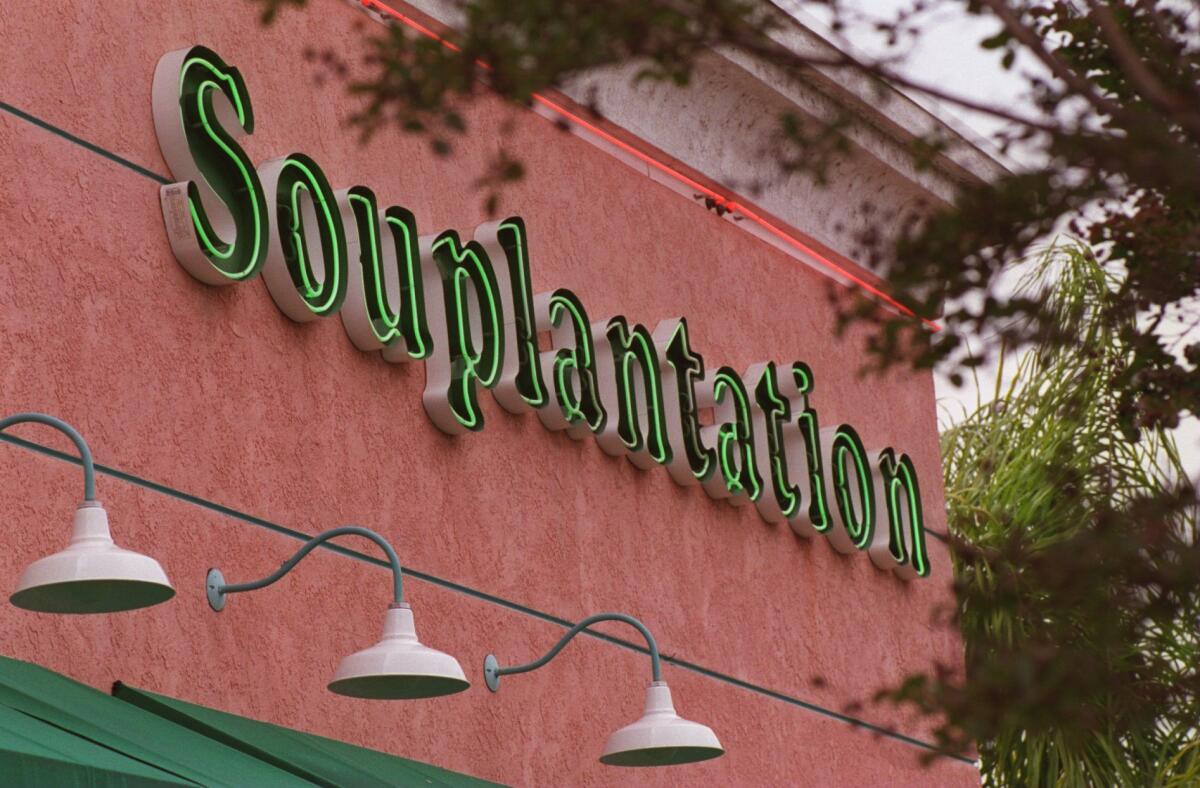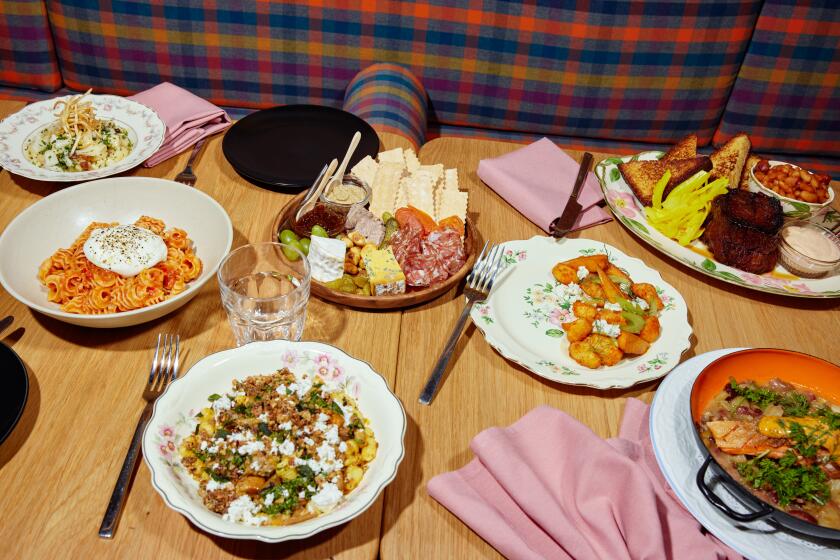Column: As an L.A. newcomer, I adored Souplantation. I’m grieving its closing

- Share via
The Los Angeles food scene is renowned for its richness and diversity. So when I moved here from New York in September 2018, I hoped to eventually find my way around the region through its cuisines, inspired by the example of the beloved critic Jonathan Gold, who had died two months earlier.
Instead I discovered Souplantation.
This soup-and-salad restaurant chain — with its no-nonsense buffet-style offerings and family-friendly seating — sustained me on many nights when I was too tired to cook. The wonton chicken salad was my standby. I relished the soups — the bacon bits in the Yankee clam chowder, the robust minestrone, the sweet and tart French onion soup.
A native New Yorker, I was unfamiliar with Souplantation, and only today, upon learning of its closing, am I learning of its origins. The first Souplantation opened in San Diego in 1978, founded by a surfer; the chain expanded in the mid-1980s, after it was acquired by two young entrepreneurs. It weathered an E. coli outbreak and a bankruptcy filing, growing to 97 locations and 4,400 employees at the time of its closure this week due to the coronavirus pandemic.
“Every couple of years somebody has this same great idea of a soup and salad restaurant chain, only nothing very exciting ever comes of it,” a Los Angeles Times writer remarked in 1988 after visiting the Pasadena branch.
Last year Los Angeles magazine called the chain “an institution for seniors, immigrants and hipsters” and its customers a “cult” — intended as praise.
The magazine called the food “aggressively mediocre” but marveled: “Even as L.A. becomes more widely known as one of the best food cities in the country, 70,000 residents from all walks of life still flock here weekly to gorge on comfort food classics like cornbread, baked potatoes, and chicken noodle soup.”
To explain my attraction to Souplantation: I am the opposite of a foodie. I don’t like to cook — even in a pandemic. Like many journalists, I tend to eat on the go; food is sustenance. In normal times, I grab every weekday lunch either at a tiny Los Angeles Times cafe or at the DirecTV corporate cafeteria across the street from our newsroom in El Segundo.
But it wasn’t just the simple food and the fresh ingredients. Like Souplantation, I was born during the Carter administration and achieved consciousness during the Reagan years. For my working-class immigrant family in the New York City borough of Queens, dining out meant a meal at a family-style restaurant, say Arthur Treacher’s, a Red Lobster or a Sizzler.
Even now, I wince a little at these memories. These chain restaurants are hardly sophisticated, and neither are customers like my parents, who worked as a taxicab driver and a secretary. In 1998, after I graduated from college, the first in my family to do so, my parents and I went to Las Vegas — still the only time I’ve been — so that we could sample the bountiful buffets. (My mom played the slots; I’ve never gambled a penny.)
Souplantation was less striking for its feint at healthfulness — who knows whether those calorie counts on its website were entirely accurate — than for its egalitarianism. Its dining rooms truly were a democratic space, packed with toddlers, adolescents, harried parents, the elderly — everyone, in short, other than the 20- to 30-somethings who typically define tastes in a late-capitalist society.
At Souplantation, there was no greeter or server (though other staff members, from cashiers to cleaners, were extremely friendly).
You grabbed a plastic tray and immediately got in the salad line. Then came the soups and the soft drinks. If you were really famished, you could grab a baked potato or a soft-serve ice cream. You were as likely to bump into a high chair as a wheelchair. I have eaten far more memorable meals in Los Angeles — Shiki Beverly Hills when Morihiro Onodera still ran the kitchen, David Chang’s Majordomo, Walter and Margarita Manzke’s République — but none of them in so open and welcome a setting.
The article in Los Angeles magazine mentions embarrassment three times in accounting for Souplantation’s odd popularity.
Count me embarrassed too, but also deeply sad.
It feels odd to mourn the death of a chain restaurant when so much is at stake. Hundreds of thousands of lives have been lost; the fabric of our society has been torn; and nothing — our democracy, our health, our jobs — feels secure.
Much as I have missed going to the theater and visiting museums, I had been looking forward most to the reopening of sit-down restaurants, newly reminded of my gratitude for the simplest of pleasures.
The first place I hoped to eat at was Souplantation.
More to Read
Eat your way across L.A.
Get our weekly Tasting Notes newsletter for reviews, news and more.
You may occasionally receive promotional content from the Los Angeles Times.











